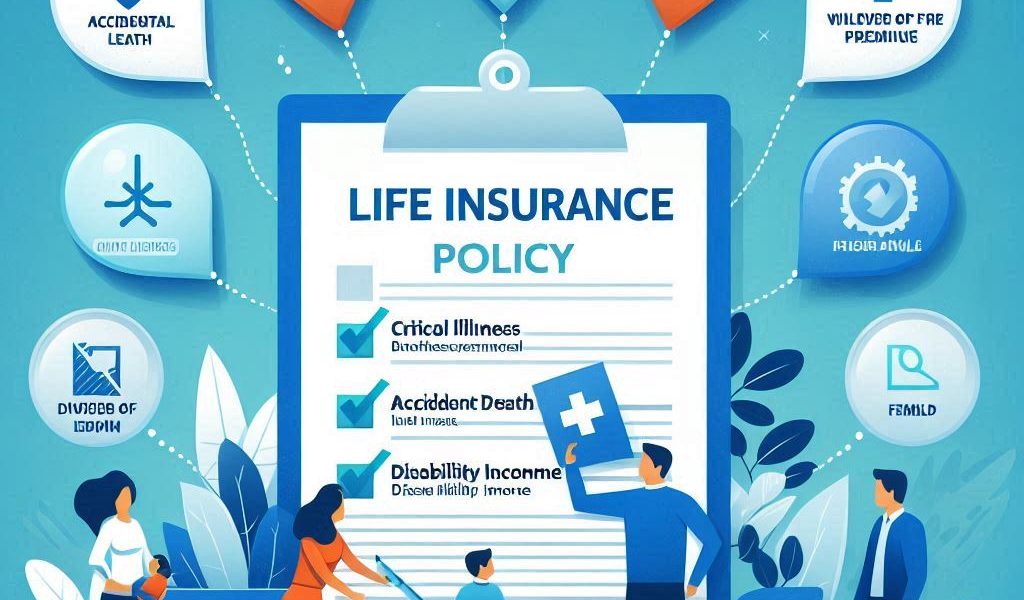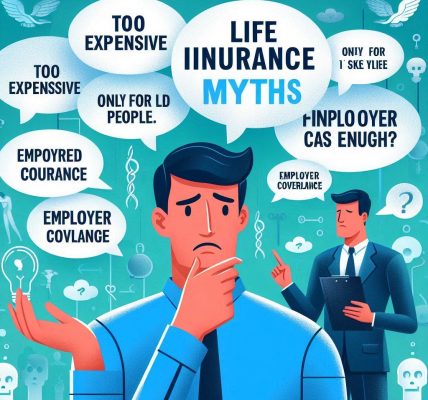Life insurance is a crucial financial tool that ensures your loved ones are protected in case of an unforeseen event. However, standard life insurance policies may not always provide complete coverage for all your needs. That’s where life insurance riders come in. Riders are add-on features that enhance the coverage of your life insurance policy, offering additional benefits beyond the standard death benefit.
But are life insurance riders worth the extra cost? In this article, we’ll explore what riders are, the different types available, their benefits, and how to decide whether they are right for you.
What Are Life Insurance Riders?
Life insurance riders are optional add-ons to a basic life insurance policy that provide extra coverage or benefits for specific situations. They allow policyholders to customize their insurance plans based on their individual needs, ensuring comprehensive protection.
Riders typically come at an additional cost, but they can prove to be valuable in times of crisis. Instead of purchasing separate insurance policies for various risks, riders allow you to bundle coverage into a single plan, often at a lower cost.
Common Types of Life Insurance Riders
There are several types of riders available, each serving a specific purpose. Below are some of the most common and useful ones:
1. Accidental Death Benefit Rider
This rider provides an additional payout if the policyholder dies due to an accident. The benefit is usually double or even triple the basic sum assured, making it a good option for individuals in high-risk professions or those frequently on the road.
✅ Pros:
- Increases the death benefit amount in case of accidental death.
- Affordable addition to standard life insurance.
❌ Cons:
- Only applies in case of accidental death, not due to natural causes or illness.
2. Critical Illness Rider
This rider provides a lump sum payment if the policyholder is diagnosed with a critical illness such as cancer, heart disease, stroke, or kidney failure. The payout can help cover medical bills, loss of income, and other expenses.
✅ Pros:
- Provides financial assistance during a serious illness.
- Helps cover expensive medical treatments.
❌ Cons:
- Covers only specified illnesses listed in the policy.
- Premiums may be higher based on health conditions.
3. Waiver of Premium Rider
With this rider, if the policyholder becomes permanently disabled or critically ill and is unable to work, future premium payments are waived while the policy remains active.
✅ Pros:
- Ensures continued life insurance coverage even when you can’t pay premiums.
- Offers peace of mind in case of disability or serious illness.
❌ Cons:
- Requires proof of disability or critical illness as per policy terms.
4. Disability Income Rider
This rider provides a monthly income if the policyholder becomes disabled and is unable to work. The income replaces lost wages and helps manage expenses during periods of disability.
✅ Pros:
- Offers a steady stream of income in case of disability.
- Helps maintain financial stability during tough times.
❌ Cons:
- Benefits may be limited to a specific period.
- Policyholder must meet the insurer’s definition of disability.
5. Return of Premium Rider
If you outlive your policy term, this rider ensures that all premiums paid are returned to you. It is commonly used in term life insurance policies.
✅ Pros:
- Refunds the total premium amount if no claim is made.
- Acts as a savings component in case no death benefit is required.
❌ Cons:
- Higher premiums compared to standard term insurance.
- Does not include interest or investment gains.
6. Long-Term Care Rider
This rider covers the costs of long-term care services such as nursing home care, assisted living, or home healthcare if the policyholder is unable to perform daily activities (e.g., bathing, dressing, eating).
✅ Pros:
- Reduces financial burden of long-term care expenses.
- Provides flexibility to access insurance benefits during one’s lifetime.
❌ Cons:
- Can be expensive depending on coverage level.
- May require medical underwriting for eligibility.
Are Life Insurance Riders Worth It?
While life insurance riders offer valuable benefits, they are not always necessary for everyone. Here are some factors to consider when deciding whether to add riders to your policy:
1. Personal Financial Situation
If you have significant savings and can afford unexpected medical or disability expenses, certain riders like the Critical Illness Rider or Disability Income Rider may not be essential for you. However, if you lack a financial backup plan, these riders could provide crucial support.
2. Family and Dependents
If your family relies on your income, adding an Accidental Death Benefit Rider or Waiver of Premium Rider can ensure that your loved ones remain financially secure even if something happens to you.
3. Health and Lifestyle
If you have a family history of critical illnesses, a Critical Illness Rider may be a smart investment. Similarly, if you work in a high-risk profession, an Accidental Death Benefit Rider can offer extra security.
4. Long-Term Goals
If you are looking for additional savings or investment benefits, a Return of Premium Rider might be worth considering, as it ensures you get back the premiums paid if no claims are made.
5. Cost vs. Benefit Analysis
Adding riders increases the overall cost of your policy. It’s important to weigh the additional premium costs against the benefits offered by each rider. If the benefits significantly outweigh the extra cost, adding a rider could be a smart decision.
How to Choose the Right Life Insurance Riders
- Assess Your Needs – Determine what risks you want to cover beyond standard life insurance.
- Compare Different Riders – Not all insurance companies offer the same riders. Compare options before making a decision.
- Understand Policy Terms – Carefully read the terms and conditions to understand coverage limitations and exclusions.
- Consult a Financial Advisor – A professional can help you choose the best riders based on your financial goals and risk factors.
Final Thoughts
Life insurance riders can be a valuable addition to your policy, offering extra protection in times of need. However, not all riders are necessary for everyone. The key to making the right decision is understanding your financial situation, risk factors, and long-term goals.




